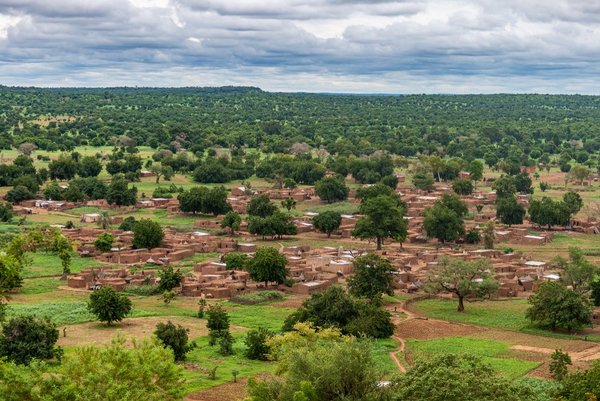 Read this article in French
Read this article in French- Share this article
- Subscribe to our newsletter
A reliable food supply in West Africa requires risk-adjusted planning
A stable and reliable food production system is a prerequisite for food security. However, food production in many regions of the world is significantly threatened by the variability of yearly crops due to extreme weather events such as droughts or floods. Climate change makes these weather events more severe and more frequent. In West Africa, where the population is growing fast and conflicts are common, the lack of progress in meeting SDG 2 Zero Hunger is especially evident.
In their new study published in Communications Earth & Environment in February, researchers of the International Institute of Applied Systems Analysis (IIASA) in Laxenburg/Austria propose a stochastic modelling framework that provides insights to achieve a more reliable local food supply. The study demonstrates how this kind of modeling can help different regions in the world facing extreme weather events to meet the zero-hunger target. It analyses food production under crop yield uncertainty due to natural variability in weather conditions and explores different strategies as to how this reliability could be increased at a minimum cost by sharing risk over time and space.
“Longer periods of drought combined with a growing population put pressure on farming communities. Governments must play a crucial role in creating financially sustainable mechanisms to support their citizens and prevent farmers from reverting to negative coping strategies,” explains Matthias Wildemeersch, a researcher in the IIASA Advancing Systems Analysis Program, and co-author of the study. “Our model focuses on the risk dimension of local food supply and clarifies the trade-off between cultivation costs and the reliability of food production. By highlighting this trade-off, policy-makers can make better informed decisions about how much risk of food insecurity is acceptable and the cost associated with mitigating it, ultimately strengthening the resilience of the food system.”
Wildemeersch and his colleagues found that risk-sharing under regional cooperation can improve the reliability of food production and also enhance the ability to guarantee stable livelihoods for farmers. Their results show how food shortages can be virtually eliminated under cross-regional cooperation in a most cost-effective way.
“In the analysis, we harness diverse datasets on droughts, crop yields, farm gate prices, cultivation costs and population projections to inform how food insecurity can be alleviated and livelihoods can be enhanced. We embed uncertainty and risk in decision-making, enabling the anticipation of extreme events and increasing preparedness for adverse weather conditions in the region,” says Debbora Leip, a doctoral researcher at the Potsdam Institute for Climate Impact Research (PIK) in Potsdam/Germany, and co-author of the study.
“This study operates at the intersection of climate, food, and social protection, and advances solutions that improve the resilience of local farmers, as well as the food security in the region. Our results demonstrate what happens when we ignore uncertainties in the design of cultivation policies. To protect the region against excessive risks, policy robustness should be a primary concern of decision-makers,” notes Elena Rovenskaya, IIASA Advancing Systems Analysis Program Director, and also co-author of the study.
(IIASA/wi)
Reference
Leip, D., Rovenskaya E., Wildemeersch, M. (2024). Risk-Adjusted Decision Making Can Help Protect Food Supply and Farmer Livelihoods in West Africa Communications Earth & Environment DOI: 10.1038/a43247-024-01242-9





Add a comment
Be the First to Comment